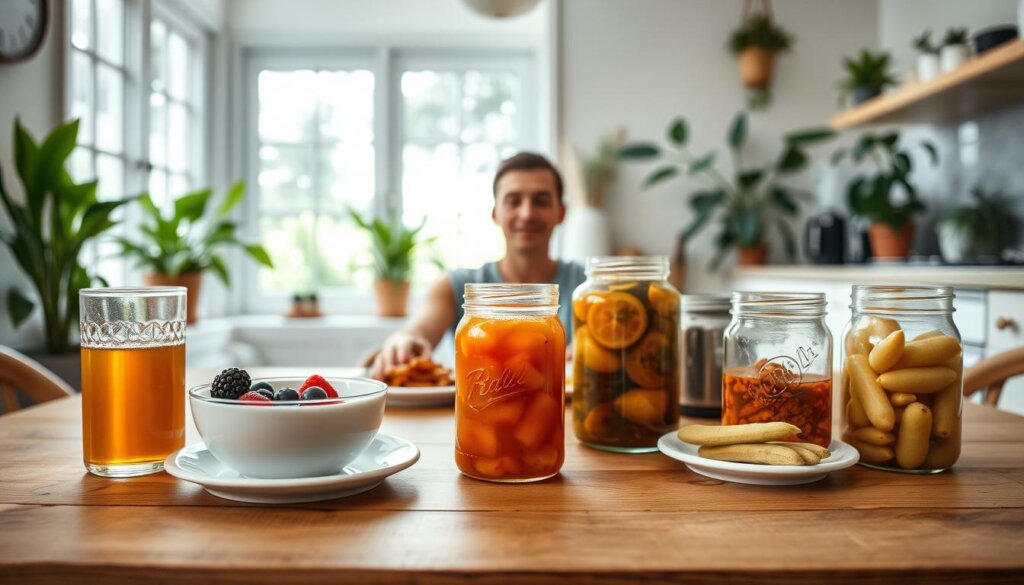Imagine trillions of invisible allies working daily to support your body’s balance. These microscopic helpers, known as probiotics, play a surprising role in maintaining wellness. While many associate them solely with digestion, their benefits stretch far beyond the gut.
Science reveals that certain strains of beneficial bacteria can influence how the body manages discomfort and swelling. For instance, studies highlight specific microbes that help regulate immune responses linked to bloating and irritation. This opens doors to natural strategies for improving daily comfort.
Wellness Group, a trusted resource in Malaysia, specializes in guiding individuals toward smarter health choices. Their team offers tailored advice via WhatsApp at +60123822655, available weekdays and Saturdays. Whether exploring fermented foods or supplements, their experts simplify the science behind targeted probiotic strategies.
This guide unpacks how these tiny organisms contribute to whole-body harmony. From selecting the right strains to integrating them into meals, readers will discover practical steps backed by research. The focus remains on safe, evidence-based approaches that align with modern lifestyles.
Key Takeaways
- Probiotics support immune function and digestive balance through specialized bacterial strains.
- Certain microbes show clinical promise in managing bodily responses to irritation.
- Fermented foods like yogurt and kimchi naturally introduce beneficial bacteria.
- Personalized guidance ensures optimal strain selection for individual needs.
- Wellness Group provides localized support for Malaysians seeking sustainable solutions.
Introduction to Probiotics and Their Health Impact
Our bodies host a dynamic ecosystem of microorganisms working silently to maintain balance. These tiny residents, particularly probiotics, form the frontline defense in nurturing wellness from within. Their influence extends far beyond basic digestion, touching nearly every aspect of physical health.
What Are Probiotics?
Probiotics are live microorganisms that act as beneficial allies in our system. Often called “friendly bacteria,” they strengthen microbial communities in the gut and other areas. Experts categorize them into strains like Lactobacillus or Bifidobacterium, each offering unique health benefits.
These microbes help prevent dysbiosis—an imbalance in the gut microbiome linked to discomfort. Think of them as gardeners tending to your internal ecosystem, ensuring diverse bacterial populations thrive. Different strains address specific needs, making personalized choices essential.
The Role of the Gut Microbiome in Reducing Inflammation
The gut microbiome operates like a command center, coordinating with the immune system to manage bodily responses. When balanced, it helps regulate signals that might otherwise trigger unnecessary reactions. Studies show certain bacteria produce compounds that calm overactive immune cells.
Disruptions in this delicate environment can lead to challenges beyond digestive discomfort. By replenishing beneficial bacteria, probiotics support the microbiome’s natural ability to maintain harmony. This partnership between microbes and our biology underscores their role in holistic health strategies.
Reduce puffiness and inflammation with probiotic
Modern research reveals how these microbial allies operate at microscopic levels to support comfort. Their mechanisms go beyond temporary fixes, targeting underlying imbalances that trigger physical discomfort.

Understanding the Science Behind Probiotic Benefits
Beneficial bacteria interact with intestinal cells to strengthen barrier functions. This prevents harmful substances from leaking into the bloodstream, a process linked to bloating and immune reactions. Specific strains produce short-chain fatty acids that nourish gut lining cells.
Studies highlight their role in calming overactive immune responses. For example, Bifidobacterium species modulate cytokine production, molecules involved in signaling inflammation. This dual action addresses both symptoms and root causes of digestive distress.
Evidence from Clinical Studies and Research
A 2018 analysis of 35 trials found certain probiotics reduced IBS discomfort by 50% in participants. Those using Bifidobacterium lactis reported fewer bloating episodes and improved stool consistency within three weeks.
Key findings from recent research include:
- 70% of trial participants experienced reduced abdominal swelling with daily probiotic use
- Inflammatory markers decreased by 40% in chronic digestive conditions
- Consistent supplementation showed cumulative effects over six months
For those exploring the best probiotic for bloating and gas, clinical data helps narrow options. Wellness Group’s experts analyze such studies to recommend personalized solutions for Malaysian clients.
Exploring Probiotic Strains for Gut Health and Inflammation
Not all probiotics work the same way. Specific strains target distinct aspects of digestive wellness, acting like specialized tools in a gut health toolkit. Matching microbial allies to individual needs creates more effective results.
Bifidobacterium lactis and Its Digestive Benefits
This strain thrives at breaking down stubborn fibers in beans, whole grains, and vegetables. By easing digestion of complex carbs, it reduces gas production that causes post-meal discomfort. Trials show 68% fewer bloating episodes after six weeks of use.
Lactobacillus acidophilus: Easing Digestion and Reducing IBS Symptoms
Known as the dairy digestor, this microbe produces lactase to help process milk products. A 2021 study found it improved stool consistency in 73% of participants with irritable bowel syndrome. Its dual action supports both nutrient absorption and bowel regularity.
Bifidobacterium infantis and Saccharomyces boulardii in Inflammation Control
This dynamic duo tackles two common triggers of gut distress. B. infantis calms immune overreactions linked to chronic issues, while S. boulardii protects microbial balance during antibiotic use. Together, they form a defense against disruptive symptoms.
| Strain | Key Benefit | Best For |
|---|---|---|
| Bifidobacterium lactis | Breaks down complex fibers | Post-meal bloating |
| Lactobacillus acidophilus | Enhances dairy digestion | Lactose intolerance |
| Bifidobacterium infantis | Reduces immune overactivity | Chronic inflammation |
| Saccharomyces boulardii | Resists antibiotics | Medication-related issues |
Malaysians can access strain-specific guidance through local wellness experts. Personalized recommendations consider dietary habits and lifestyle factors for optimal results.
Incorporating Probiotics into a Daily Wellness Routine
Creating a sustainable probiotic routine balances convenience and science-backed strategies. Whether through supplements or fermented foods, consistency helps maintain microbial harmony in the gut. This approach supports long-term digestive wellness without disrupting busy schedules.

Choosing Between Supplements and Fermented Foods
Supplements provide precise doses of strains like Bifidobacterium lactis, ideal for targeting specific concerns. Capsules or powders offer portability for professionals juggling work and family. For food-based options, yogurt and kefir deliver live cultures alongside calcium and protein.
Sauerkraut and kimchi introduce Lactobacillus strains through flavorful additions to meals. These foods often contain prebiotic fibers that feed beneficial bacteria. Pairing a morning smoothie with a nighttime capsule creates a balanced daily strategy.
Timing and Dosage for Maximum Benefits
Taking probiotics 30 minutes before breakfast capitalizes on lower stomach acid levels. This time frame helps more bacteria reach the intestines alive. Evening doses work well if paired with light snacks like almond butter on rice cakes.
Most adults benefit from 1-10 billion CFUs daily, though individual needs vary. Starting with smaller amounts allows the gut to adjust gradually. Those exploring the top benefits of probiotics often combine morning supplements with afternoon fermented snacks for all-day support.
Probiotics and Lifestyle: Enhancing Overall Gut Health
Building a resilient digestive system requires more than popping supplements—it thrives on daily habits. Lifestyle choices shape the environment where gut health flourishes or falters. Small, consistent changes often yield the most sustainable results.
Diet Strategies to Complement Probiotic Intake
Fiber-rich foods like oats and bananas act as fertilizer for beneficial bacteria. These prebiotics help probiotics help maintain microbial diversity in the gut. Pairing kimchi with brown rice or yogurt with berries creates powerful synergy.
Processed snacks and sugary drinks starve good bacteria. Swapping them for whole foods gives the microbiome the tools to fight imbalances. Even simple swaps—like choosing herbal tea over soda—make a difference.
Integrating Exercise and Stress Management
Regular walks boost blood flow to digestive organs, aiding nutrient absorption. Studies show active people have 30% more diverse gut bacteria than sedentary individuals. Even 20-minute daily routines may help.
Chronic stress shrinks populations of helpful microbes. Techniques like box breathing or morning stretches calm both mind and gut. Malaysians can explore local parks for free tai chi sessions—a double win for movement and relaxation.
| Lifestyle Factor | Benefit | Action |
|---|---|---|
| Fiber Intake | Feeds beneficial bacteria | Add 1 serving of vegetables per meal |
| Hydration | Maintains mucosal lining | Drink water before caffeine |
| Exercise | Boosts microbial diversity | Take stairs instead of elevators |
| Stress Management | Protects gut-brain axis | Practice 5-minute meditation daily |
| Sleep Quality | Supports immune function | Aim for 7-hour nightly minimum |
Most health benefits appear gradually—typically within 4-8 weeks of consistent effort. Combining smart eating with mindful movement creates lasting change. Remember, every positive choice feeds both body and bacteria.
Wellness Group: Expert Guidance and Support in Malaysia
Navigating probiotic choices can feel overwhelming without proper guidance. Wellness Group simplifies this journey for Malaysians through science-backed solutions tailored to local lifestyles. Their team bridges the gap between research and practical health strategies.
Personalized Support When You Need It
Reach Wellness Group’s experts via WhatsApp at +60123822655 for advice on managing digestive conditions or selecting quality supplements. They help identify strains that survive stomach acid to benefit gut bacteria effectively.
Accessible Expertise Nationwide
Consultations run Monday-Friday (9:30 am-6:30 pm) and Saturdays (10 am-5 pm). This schedule accommodates working professionals seeking reliable sources of probiotic support. Their team stays updated on strains that help reduce discomfort linked to bowel syndrome.
Since probiotic quality varies widely, Wellness Group prioritizes products with proven results. They guide clients in avoiding interactions with medications while addressing gut issues. For those exploring targeted probiotic strategies, their localized approach ensures culturally relevant solutions.
FAQ
How do probiotics help with bloating and gut discomfort?
Probiotics support a balanced gut microbiome, which aids digestion and reduces gas production. Strains like Bifidobacterium lactis improve nutrient absorption, while Lactobacillus acidophilus can ease irritable bowel syndrome (IBS) symptoms by regulating bowel movements.
What are the best probiotic strains for managing IBS?
Clinical studies highlight Lactobacillus acidophilus and Bifidobacterium infantis as effective for IBS. These strains minimize abdominal pain, regulate stool consistency, and may lower inflammation linked to digestive disorders.
Can fermented foods replace probiotic supplements?
Foods like yogurt, kefir, and sauerkraut offer natural sources of beneficial bacteria. However, supplements like Culturelle or Align provide standardized doses for specific health needs, making them ideal for targeted support.
How long does it take for probiotics to improve gut health?
Most people notice changes in 2–4 weeks, but results vary. Consistency is key—daily intake paired with fiber-rich foods like oats or bananas enhances bacterial growth and long-term gut balance.
Are there side effects when starting probiotics?
Some experience mild gas or bloating as the gut adjusts. Starting with low doses of strains like Saccharomyces boulardii and gradually increasing intake helps the body adapt smoothly.
How does Wellness Group assist with probiotic choices in Malaysia?
Wellness Group offers personalized guidance via WhatsApp at +60123822655. Their experts recommend trusted brands such as Renew Life or Garden of Life and share tips on diet or stress management for optimal gut health.
Can exercise enhance probiotic benefits?
Yes! Physical activity boosts circulation and digestion, helping probiotics thrive. Pairing workouts with stress-reduction practices like yoga further supports a healthy microbiome and immune function.






